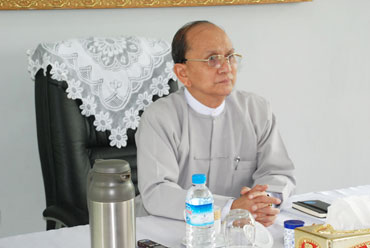An effort to read a message from President Thein Sein on the conflict in Rakhine State to a joint session of the Burmese Parliament was cancelled on Thursday, after objections from members of the Rakhine Nationalities Development Party [RNDP].
 RNDP leaders said the message alleged that some Rakhine [Arakanese] nationals supported violence. The RNDP objected, and the reading of the review was cancelled. The RNDP was not cited in the report.
RNDP leaders said the message alleged that some Rakhine [Arakanese] nationals supported violence. The RNDP objected, and the reading of the review was cancelled. The RNDP was not cited in the report.
Mizzima obtained a copy of the review, which listed nine points and proposed short and long-term efforts to overcome the communal unrest between Rakhines and Rohingyas.
Regarding nine facts contained in the subtitle “Situations of Ethnic Rakhine People,” fourteen RNDP MPs could not accept the statements except for one that said both sides suffered mental pain due to the conflict and that the region has been set back, said an RNDP official.
The review of the community violence said some political parties, monks and individuals incited “extreme racial hatred” and encouraged people to “commit irrational racial attacks” against “Bengali Muslims.”
“The allegations said [we...Rakhine people] encouraged [people] to have violent minds and to attack each other, and it is a serious allegation,” Dr. Aye Maung of the RNDP told Mizzima. “We don’t have violent minds. But, it says we [some Rakhine] were thinking about committing violence. We can’t stand the allegation that says we are violent people. Are we violent people? Is it our custom?”
The review also said some people did not understand that Rohingyas can qualify for citizenship under the Burmese Citizenship Law.
The review said that some Rakhine businesspersons tried to take advantage of the conflict to get the upper hand on businesses owned by Rohingyas.
The review also said that some Rakhine [Arakanese] alleged that immigration officials committed illegal acts and did not prevent Bengali from illegally entering into Burma. It said some Rakhine bear grudges against the United Nations and international NGOs [INGOs] and object to their presence in the area.
Moreover, the review said the ruling Union Solidarity and Development Party [USDP], in certain instances, did not obey the law and courted Rohingya favours in order to win votes.
It said that 75 per cent of the Rohingya population in the area of unrest lived in poverty.
The report said extremist Rohingya leaders tried to brainwash people and exploited honest people in order to get donations from Islamic countries and some extremist Islamic organizations by emphasizing the sufferings and hardships of Rohingyas, and to attract other humanitarian support.
To address the issue, the review listed several short-term solutions: obtain reliable figures on the number of Rohingyas and relevant immigration figures; to enhance security and establish more effective law enforcement; to cooperate with the UN and international NGOs; and to report accurate news and information from the area.
Long-term solutions included building all-weather roads along walls put up in areas of the Bangladesh-Burmese border; to improve communication between racial groups, to carry out the Sittway [Sittwe] civil project; to build a Sittway-Maungdaw bridge; and to improve the education and health of Rohingyas in order to promote and improved society.
Other specific steps mentioned included addressing the issue of land disputes between indigenous Rakhine and Rohingyas and to cooperate with India and Bangladesh business ventures to improve the area’s economy.
Also, included was the development of the Rakhine State shipbuilding project, to increase the region’s supply of electricity and to promote ecotourism projects.
Extremist Islamic groups will be eliminated, said the review, by reducing the number of mosques, Arabic schools and radical Islamic preachers in Maungdaw, which it called a stronghold of extremists.


